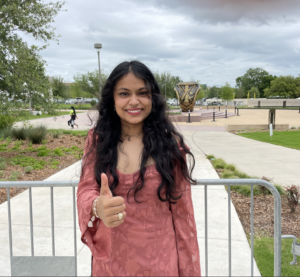Illuminating Humanities: Uma Sarkar

Uma Sarkar, 2023-24 Glasscock Undergraduate Summer Scholar, Computer Science, Texas A&M
The Glasscock Center is excited to continue this series that highlights humanities research at Texas A&M, as well as the vital role played by the humanities beyond the academy.
For this highlight, we invite Uma Sarkar to tell us about her experience as a Glasscock Center Undergraduate Summer Scholar (UGSS) participating in the Ethics And Politics Of Artificial Intelligence seminar directed by Dr. Glen Miller (PHIL).
Uma Sarkar is a Senior majoring in Computer Science with a minor in Philosophy at Texas A&M University; after graduation, she is planning on pursuing either a doctoral degree concentrating on applied Artificial Intelligence (AI) and AI ethics or continuing to work as an industry consultant.
Sarkar is a Glasscock Center Undergraduate Summer Scholar who recently participated in the Ethics of Politics and Artificial Intelligence seminar directed by Dr. Glen Miller (PHIL), which critically examined the social, ethical, epistemological, and legal ramifications of various forms of AI.
The UGSS program provides various resources, including mentorship, to undergraduate students with the goal of developing a proposal for submission to the LAUNCH Undergraduate Research Scholars thesis program. Participating in the UGSS program enables students to conduct a lengthier and more in-depth research project, which Sarkar sees as “an opportunity for students to pursue what they are really curious about.”
Sarkar began cultivating her interest in computer science in the eighth grade. “For me, I kind of see computer science as a tool, like a means towards almost any end,” she says. “I’m really curious about a lot of things and computer science has really allowed me to explore my different interests while using computer science and data science as analytic tools to get questions answered, make sense of and build narratives.”
Sarkar’s interest in humanities research began with her enrollment in faculty director Dr. Glenn Miller’s (PHIL) course “Ethics in the Digital Age.” Dr. Miller’s mentorship continues to influence Sarkar’s future and scholarship in multiple ways, from helping her decide to attend graduate school to working on improving her writing.
Dr. Miller’s approach to AI eased students into the topic during the first weeks. “We went through a lot of really iconic papers in the field of computer science just to gain that background knowledge,” she says. “I feel like that was really, really useful to build the context that is needed, and it honestly made me feel a lot less intimidated because starting from the beginning of anything [makes] it more approachable.”
After creating a solid knowledge foundation, Sarkar says the structure of the seminar became more flexible. “We started exploring different topics that interested us…started following our interests and really trying to figure out what we wanted to talk about.”
What excites Sarkar the most about research is the possibility for boundless pursuits where “you pick a niche, get endlessly curious about it, and then dig into it until you can’t anymore.” Sarkar says the biggest lesson she has learned so far is that context matters, especially in STEM. “I feel like a lot of STEM research that I read exists in a semi-vacuum because scientific methods lead us to think there might be consensus,” she says. “But through my own research, I found out that the perspective and the context of who is working on the research matters so much more than I thought initially.”
Sarkar’s primary interest is in AI alignment, an area of AI ethics that aims to ensure AI works exactly as expected. Strengthening the relationship between the humanities and AI is important, Sarkar suggests, because the technology world lacks crucial interdisciplinary perspectives to alleviate society’s fear of AI. Incorporating the humanities into AI alignment provides the best chance to forge the safest path forward, Sarkar says.
“Humanistic thinking is necessary for AI,” she says, “because the broad reach of the technological products has an affect on a very large number of people.”
